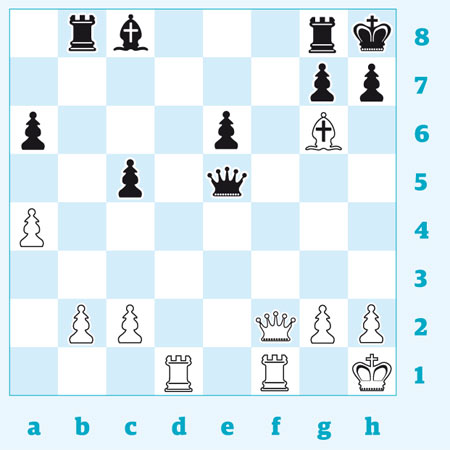“I haven’t stopped my fight against the regime,” says Garry Kasparov, his words bristling with defiance and quiet rage. “I’m not lowering my voice. Putin is not just a Russian imperialist. He has a much bigger agenda. He is an existential threat to the free world.”
It would have been easy for the greatest chess player in history to stay quiet after fleeing Russia in 2013 amid a crackdown on prominent opposition figures. Kasparov, after all, is a successful businessman, an expert on artificial intelligence and cyber security, and has just launched a new website, Kasparovchess.com. But that has never been his style. Not now. Not ever.
“In the west there is a lot of self‑deception, multiplied by business interests and apathy, about Putin’s true intentions,” he warns. “No one wants confrontation. But people need to recognise that Russia is a fascist dictatorship, which has no restrictions when it comes to destroying political opponents – in and outside – of Russia.”
Kasparov has experienced the cost of opposing Putin. He was jailed in 2007 for five days and then bruised, quite literally, when beaten by police during a peaceful protest in 2012. Those days in Russian politics, he says, made him miss his time at chess, where at least there were clear rules.
Will he ever go back? “Boris Nemtsov came back,” he replies. “Alexei Navalny came back. What’s the point of becoming a martyr? I can do much more by staying here.” Things have got so bad in Russia, Kasparov says, that he is unsure whether he would prefer to live under Putin or Soviet communism in the 1970s and early 80s.
“That’s a tough question. Twenty years ago, I’d say definitely things were better. Even 10 years ago I would not hesitate. Today I don’t know. It depends on the angle of the observation. But the fact is I have to live outside Russia. And the regime is more aggressive and more dangerous than the Soviet politburo. Yet at the same time there’s also a chance, because young people know how different life is outside of Russia.”
The west’s response to Putin, Kasparov says, must start with recognising the threat – and then standing up to the regime by imposing far greater sanctions on the oligarchs that support him. “Putin’s interest, if we use a chess analogy, is to make sure that the game is not played by any rules, unless he chooses them. He wants to ruin the world that was built after the second world war, one that was based on compromise, consensus, and respect for treaties. The international community has to face up to that.”
Kasparov is also squaring up for battle on a second front as he attempts to capitalise on the extraordinary chess boom of the past year by launching Kasparovchess.com. It promises chess lessons from the world’s best players, designed for every ability, a strong community, and the opportunity to face Kasparov.
The website is backed by the French multinational Vivendi, but Kasparov knows the competition will be intense. The world’s biggest chess site, Chess.com, has more than 30 million members, while the Play Magnus Group, owned by the world champion Magnus Carlsen, attracted £40m of investment when it launched on the Norwegian stock exchange last year.
“Magnus has the world title and resources, and that gives him a tremendous edge. However when it comes to content, I think we will be superior. We will be offering even more, at a much lower price. And although I’m no longer a formidable force in chess, I know how to promote and sell the game, and to get people excited.”
While they might be rivals in business, it is obvious Kasparov has immense respect for Carlsen, who has been the world No 1 since 2011, and world champion since 2013. The pair worked together, briefly, when the Norwegian was a teenager and Kasparov still follows his games closely.
“Magnus is still very passionate about the game. And he has this motivation, like Bobby Fischer, to win and to fight – and also an ability to use every resource like Anatoly Karpov. It’s a deadly combination.”
Kasparov won’t be drawn on who is the best ever. “It always has an element of subjectivity,” he says. “It’s like arguing who was the best football player: Pelé, Maradona, or Messi? But Magnus has already clearly had a phenomenal career. More than that, he has helped make chess mainstream.”
But there is a word of warning for the reigning world champion too. “Magnus is still the best player, and I doubt very much he will be at any risk of losing the world championship match [against Russia’s Ian Nepomniachtchi] later this year. But two years from now, who knows? Alireza Firouzja is just 17 but rising, and Carlsen is 30 now. In the last year, especially in rapid and blitz, he’s making blunders.”
As he speaks there is a flash of the old Kasparov: someone who would glare at his opponents like a pitbull while making impossible calculations many moves deep – part Mike Tyson, part Stephen Hawking. That, he insists, wasn’t a deliberate strategy to intimidate his rivals.
“Everything I did at the chessboard was natural,” he says. “At the helm of my career, I lived every game. It was not just playing. It was a matter of life and death. I was so motivated and devoted. Losing was a big pain to me – almost a physical pain – and as long as we were at the chessboard I looked at my opponent as more than that. They were an enemy force to be destroyed.”
In chess circles he was known as “The Boss”, and was still on top when he retired in 2005. His fitness and legendary preparation helped, he admits, as did his thirst for victory. “There are many great athletes and sportsmen in history that developed the same attitude,” he says. “What I probably managed better than others is that I never lost my steam. I was still motivated to play a great game or to take a challenge at the end of my career, as I was in 1980.”
Even now chess remains an important part of his life, and he talks with pride about his recent work as a consultant on the Netflix series The Queen’s Gambit. Not only did he choose the games, but he worked hard on ensuring it was as authentic as possible, from the way the players touched the pieces through to ensuring the world champion, Vasily Borgov, was followed by KGB agents.
Kasparov believes the series not only fuelled a boom in online chess but helped rehabilitate the game among the wider population. “For a long time chess was seen not only as a nexus of intellect and creativity, but also a potential threat to your mental stability,” he says. “The stories are there, from Paul Morphy to Fischer, so you can’t deny it created some kind of psychological barrier.
“I believe the Queen’s Gambit has almost cleansed chess from these fears, especially among parents. Because, contrary to what people thought about the game, it didn’t bring her down, it actually lifted her up. It helped her struggle against her own ghosts, and her own psychological problems.”
Kasparov’s passion for the royal game still burns so bright, more than 50 years after he first picked up a chess piece, and it seems only right to ask whether he has ever fallen out of love with it? “Never,” he replies. “And while my business engagements keep growing, you will still see me a lot on my new site. Chess is oxygen to me.”











